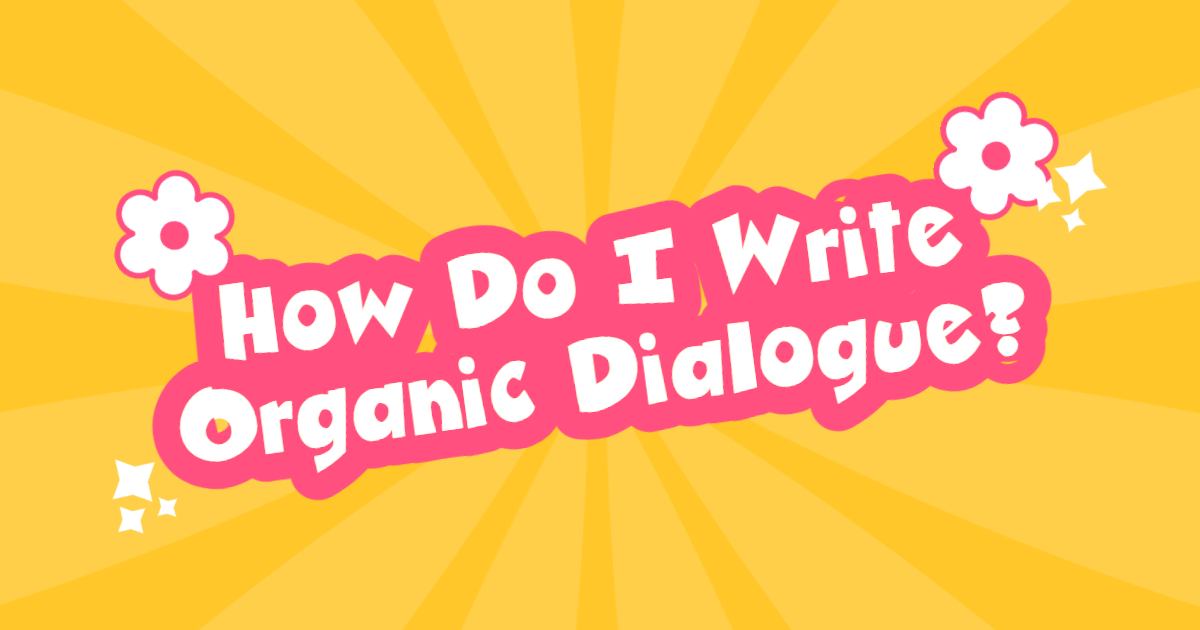|
“Father, I did not know you were there, in the kitchen,” I said.
“I see,” he responded. “Well, Sarah, I have just come in from the garden. I do not know why you did not see me.” Yikes! Wow, that’s some seriously bad dialogue. You know the saying about porn? “It’s hard to define, but I know it when I see it.” Yeah, that’s bad dialogue. Bad dialogue can absolutely, single-handedly ruin your book. Getting a grasp on writing organic dialogue is one of the most important things a writer can do for their craft. But how do you spot bad dialogue? And how do you write organic dialogue? Contract.
People almost exclusively use contractions in speech unless it’s for emphasis. “I don’t know where your hat is,” might escalate to “Dude, I DO NOT KNOW where your hat is!” But in regular, ongoing speech, it’s better to err on the side of contracting than to separate out all your “do not”s.
Don’t say their name.
This is probably the biggest offender we see in new authors’ unedited books. People don’t say each other’s names! Again, unless it’s for emphasis, people literally don’t say each other’s names when they’re speaking to each other. Why would they?
In the above example (silly, I know), Father calls Sarah Sarah and Sarah calls Father Father. Sure, it’s only a two-line exchange, and we don’t know what might be going on around them. But say they’re alone. Why would Sarah need to say “Father”? Who else might she be talking to? She’s probably even looking at him. And further, Father certainly doesn’t need to say “Sarah,” as he’s directly answering Sarah’s question. Again, emphasis changes how we speak. “I don’t know where your hat is,” might escalate to “Sarah! I SAID I didn’t know where your hat is!” In a tender moment, a character might say another’s name. But in general, skip the name-calling. We “‘we” being the characters and the readers) all know what’s going on here. Skip dialogue tags when possible.
“Hey,” I said.
“Oh hey, what’s up,” Emily responded. “What are you working on?” I asked curiously. “Just painting,” Emily answered. She waved her paintbrush and giggled. “Ah,” I said. “That’s cool,” I added. Ugh, I’m exhausted just writing that example! Reduce dialogue tags so your readers don’t get exhausted! Of course, dialogue tags can be crucially important for making a dialogue exchange clear. However, they are also criminally overused in amateur writing. When dialogue happens in real life (I think we just call that “talking”?), it happens quickly. For your reader to perceive your dialogue as organic, it helps if it can be read quickly. Dialogue tags slow down your dialogue. They’re clutter. They almost never bring new, true meaning into your book. Cut dialogue tags you don’t need—for example, if two characters are talking back and forth, you can seriously limit your dialogue tags, as it’s as simple to keep track of those conversations as it is to watch tennis. Even when you’re writing scenes with bigger casts, you can limit dialogue tags. Cut a dialogue tag and opt instead to include some body language that augments the dialogue. Cut a dialogue tag and add some inner monologue. Cut a dialogue tag and trust your reader to be able to follow. Even with a cast of several characters, if two are talking back and forth for several lines, you simply don’t need dialogue tags. Trust your reader! They aren’t stupid. They’re actually probably quite skilled at reading. So trust that they can follow what’s happening even when you don’t label every single word. Mess up.
You know what humans definitely don’t do? Talk good. Haha! Short of a highly skilled professional public speaker, humans no talk no good. We say dumb shit. We mess up and keep going. We mess up and stop and start over! We start a sentence and halfway through we forget what we were saying.
People don’t talk in complete sentences, not really. We speak in bursts. In linguistics, they aren’t even called “sentences,” because they’re different; they’re called “utterances,” and their rules are different. None of your characters should be speaking in complete sentences all of the time. It’s just not realistic! Write your characters messing up. Especially in emotionally charged moments, your characters won’t be speaking perfectly. It shows their humanity if they talk dumb when mad, just like us. Write each character to speak differently.
People speak differently. All people, even similar people, speak differently. By writing each of your characters to speak differently, you make their speech more organic—and you make your character fuller and more convincing at the same time!
Some people stutter a lot. Some people use big words because they read a lot. Some people use big words because they want to sound like they read a lot. Some people don’t talk often. Some people never stop talking. Some people are interrupters; some people wait for an opening. Some people have accents; some people have speech impediments. Some people speak quickly and energetically, off the cuff, while others are more measured and plan carefully. It’s been said (by someone, idk who) that you should be able to tell who in your book is speaking without any dialogue tag at all, just by looking at how they speak. Like much writing advice, this is an excellent guide, but don’t take it literally. You can’t make every single utterance reflect a whole personality. But generally, readers should be able to notice differences in characters’ speech patterns. Read it aloud.
The only way to truly evaluate if your dialogue sounds organic is to read it aloud to yourself or to someone else. When the words come out of your mouth, they should feel natural. You’ll notice really quickly that you need more contractions, that your lines are too stilted, that your characters all sound the same, when you start reading aloud.
Dialogue can make or break a book. A book with a weak plot or theme can be literally held aloft by its characters and their dialogue. Artful, realistic dialogue is the hallmark of a skilled author. So do your work and make sure that all your characters are speaking organically and authentically to themselves. written by Christina Kann
0 Comments
Leave a Reply. |
How Do I Book?We'll try to find the answer to that question in our blog. Archives
August 2023
Categories
All
|


 RSS Feed
RSS Feed